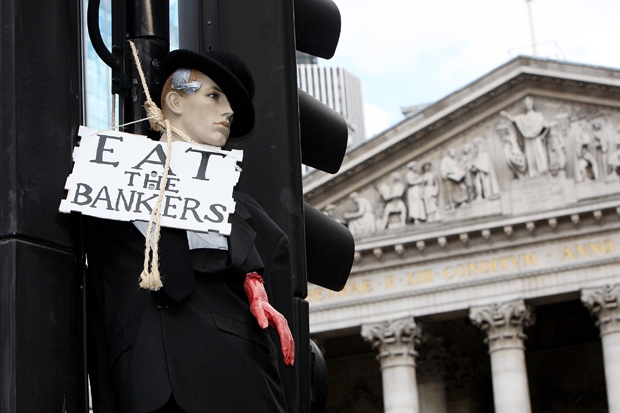Once upon a time, a powerful unkillable beast menaced the nation. It had to be tamed. It could only be tamed by a robust ethos of the common good. This gradually emerged: a new democratic spirit was born! But soon critics popped up, complaining about aspects of the new order, calling it stifling, limiting, pompous and dated. They gained power: the fools uncaged the beast! For three decades it has trampled all over public life, declaring the profit motive to be the only realism; it has unbalanced industry, empowered reckless bankers, and forced public services to dance to its commercial tunes; it has utterly subverted the left, which dared not challenge it, but rather trusted that it would bring universal benefits. It didn’t: it brought rising insecurity, and hideous new levels of inequality, and environmental doom. Worst of all, the beast has got inside our heads, so that the idea of re-taming it strikes us as sentimental naivety.
David Marquand tells this story well. His polemic is calm, considered, yet impassioned, as that comma in the subtitle suggests. Unlike the average Guardian columnist, he avoids self-righteous rhetoric, and honestly reflects on the lack of easy answers. He has written a stimulating sketch of political ideas, which provides a good insight into the battered, near-despairing state of the intelligent left. Shouldn’t the left be confident these days, with capitalism’s claim to deliver general wellbeing looking shakier than ever? Ironically, this only magnifies the weakness of the left: its opponent stumbles and leaves an open goal, but it still can’t score.
He starts with the Victorians. As Trollope’s Melmotte and Dickens’s Merdle show, gangster capitalism was rife. But thinkers including Carlyle, Mill and Ruskin were clear: greed is the exact opposite of good. This public moralism was developed in the next century by Tawney, Temple, Keynes and Reith. In mid-century, Britain was a strong ‘civic culture’ with lots of communal rituals, from ‘church weddings to… the Cup Final’.
Enter stage right and stage left the two villains of the tale: ‘market individualism’ and ‘moral individualism’. Hayek is the prophet of the first; the second seems harder to pin down. It has roots in the Bloomsbury group and in the family-bashing guru R.D. Laing. They were mirror images of each other, naive in contrasting ways:
Market individualists assumed that free choice in the economy would go hand in hand with respect for traditional morality. Moral individualists assumed that the ethic of ‘doing your own thing’ could be confined to the private sphere, while economic life was organised on (unspecified) collectivist lines. Not surprisingly, both assumptions turned out to be false. Hedonism was indivisible.
This is acute, until the last sentence. For surely hedonism wasn’t quite what Enoch Powell, Keith Joseph and Margaret Thatcher were about. They were puritan patriots, Kipling fans, convinced that freer markets could restore Britain’s greatness. (An overlooked aspect of Thatcher’s thinking is her deep optimism about human nature, or maybe British nature. Free Britons up and they will gravitate to virtue. She was our Rousseau, in a way.)
Of course Marquand does not give his two villains an equal drubbing. The rest of the book relates the erosion of the public realm by ‘Chicagoan’ economics, which has a cultic aura; it ‘offers its members comradeship, excitement and the joy of battle against the unregenerate’. He shows that rolling back the state entailed massive new centralisation, to clear the way for markets. New Labour’s ‘wispy communitarian streak’ could not rescue the nation from this ideology, whose triumph was not an inevitable aspect of globalisation — other European nations largely resisted it.
But it’s not clear what he thinks Blair and Brown could have done to turn things round, for he admits that the left has lacked a credible alternative ideology (he criticises Tony Benn’s nostalgic, dogmatic advocacy of a purer socialism). It seems that good politics is defensive: resisting the erosion of what remains of the public realm. But this view can’t escape a form of nostalgic dogmatism. For example he attacks the current free schools policy as a ‘marketising’ reform, in that it aims to offer parents more ‘choice’. It’s dogmatic to see this policy in terms of free-market dogmatism. Maybe it’s a valid attempt to revive the public realm, despite its unattractiveness to old lefties.
He concludes that we need to re-tame capitalism, master it. (By the way, it’s questionable whether this metaphor helps his cause: doesn’t it flatter capitalism’s sexy wildness? But perhaps this is inescapable.) How? Though not a believer, he argues that religious traditions have a central role in forging a new public language ‘premised on the assumption that the common good comes before individual appetites’. A new morality, personal as well as political, is needed, he slightly shyly announces, as if this is beyond his normal remit.
This book is an interesting milestone in the failure of the secular left, the realisation that pursuing the New Jerusalem might possibly have something to do with myth and religion. Who’d have guessed it?







Comments